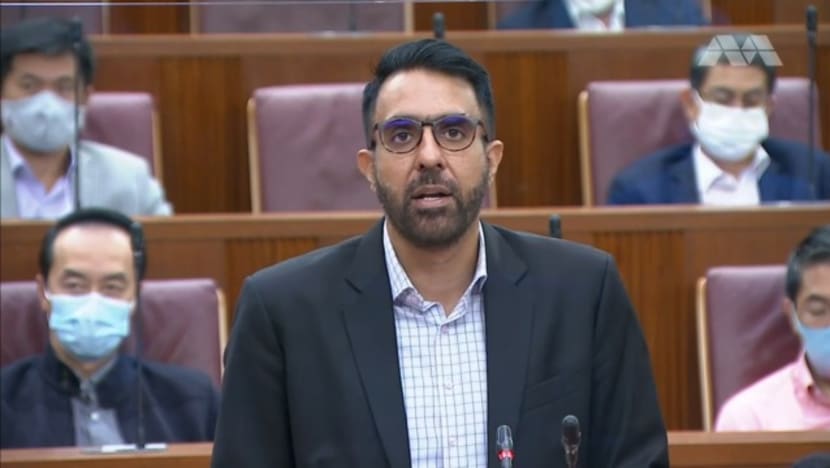Workers' Party proposes amendments to motion on foreign employment and Singaporeans’ jobs and livelihoods

Leader of the Opposition Pritam Singh in Parliament on Sep 14, 2021.
SINGAPORE: Leader of the Opposition Pritam Singh on Tuesday (Sep 14) proposed amendments to a motion tabled by Minister of Finance Lawrence Wong on securing Singaporeans’ jobs and livelihoods.
The original motion read: “That this House (a) acknowledges Singaporeans’ anxieties about jobs and competition in a globalised and fast-changing economy;
“(b) affirms Singapore’s need to stay open and connected to the world in order to grow and prosper;
“(c) supports Government actions to manage the population of foreign manpower, ensure fair treatment by employers, and invest in education and upskilling, to create more good jobs for Singaporeans;
“(d) calls on the Government to continue to update and improve its policies to secure the well-being and livelihoods of Singaporeans in an uncertain post-pandemic world; and
“(e) deplores attempts to spread misinformation about free trade agreements like the Singapore-India Comprehensive Economic Cooperation Agreement (CECA), stir up racism and xenophobia, and cause fear and anxiety amongst Singaporeans.”
Mr Singh proposed adding an additional clause to the amendment: “(f) calls on the Government to proactively release information on jobs and employment prospects of Singaporeans and the costs and benefits of free trade agreements and foreign worker policies, with a view to formulating better policies to ensure Singaporeans secure good jobs in Singapore and are not disadvantaged when seeking employment.”
He also suggested amending part (c) to read: “Calls for stronger Government actions to manage the population of foreign manpower, ensure fair treatment by employers, and invest in education and upskilling, to create more good jobs for Singaporeans.”
Mr Wong had introduced the motion in response to Non-Constituency Members of Parliament (MPs) Leong Mun Wai and Hazel Poa’s motion on foreign talent policies. The Progress Singapore Party members called on the Government to take action to address Singaporeans’ anxieties on jobs and livelihoods caused by the foreign talent policy and movements of persons under some free trade agreements (FTA).
In his speech, Mr Singh said that part (f) captures what the Workers’ Party (WP) believes represents a “fundamental change of culture needed with respect to information disclosure”.
“A proactive approach to disclosure would operate to take the sting out of misinformation campaigns that ride on jobs and unemployment insecurity and encourage affect-based compensation amongst our people,” he said.
WP’S STAND
Laying out the WP’s stand on FTAs and CECA, Mr Singh said that the party accepts that FTAs have encouraged investments and created jobs and opportunities for Singaporeans.
He also noted the Government’s explanation that CECA does not give Indian nationals free rein to enter Singapore, and that the employment of foreigners in Singapore is regulated by the Government, specifically through the Ministry of Manpower’s (MOM) work pass policies.
“However, we believe that it is fair to ask whether the Government and the MOM for many years past, has failed to regulate work passes in the best way possible,” he said.
He added that WP “does not assume” that good jobs are automatically created for Singaporeans by virtue of its pro-trade policies and “strong network” of FTAs, including CECA.
“We believe that for a few groups such as the sandwiched class workers who lack skills and lower-income Singaporeans, the opposite may well occur,” he said.
“Our view is that the Government needs to intervene aggressively through policy or legislation to ameliorate this and ensure the availability of stronger safety nets for Singaporeans who cannot make the transition.”
The Government should also “proactively report” on the costs and benefits of Singapore’s FTAs across time, the leader of the opposition said.
Mr Singh acknowledged that some have used CECA as a “dog whistle”, “masquerading racism for genuine economic concerns”.
“The Workers' Party accepts that genuine economic concerns exist and that it is fair to raise concerns about them. However, we abhor and denounce the racism and xenophobia that has become a part of the public narrative in some quarters,” he said.
Related:
PUBLIC’S PERCEPTION OF JOB INSECURITY
In summing up the public’s perception of foreign employment and job insecurity, Mr Singh said that there have been “long simmering emotions” among a “sizable number” of Singaporeans surrounding CECA and the perception that Singaporeans are denied fair opportunities in the job market.
Job displacement is “very emotionally jarring”, he said, especially when the individual finds out that their job has been “rejigged” and filled by a foreigner.
He added that it is “upsetting” when Singaporeans learn that a foreigner has filled jobs that a Singaporean is “suitably qualified” for.
Although currently directed at Indians, such emotions have been directed towards other communities in the past, such as workers from China during the early 2000s, said Mr Singh.
“An important distinction between the vitriol directed against the PRC workers was that many of them were employed in low-, middle-income sectors, while there has been an acute focus on Indian professional workers today.”
The “influx” of professionals of Indian ethnicity has stirred emotions in many Singaporeans, he said.
“Some ask, why can’t our people do those jobs? After all, our students score so well on standardised tests, our much vaunted educational system should have put our workforce in a much better position,” he said.
Mr Singh suggested that in some cases, when Employment Pass (EP) and S Pass holders struggle to communicate in Singapore’s “workplace lingua franca”, English, this could affect Singaporeans’ sense of home.
Some Singaporeans who benefit from the growing economy, or new immigrants, could accept this more readily, said Mr Singh.
“But for those who lose their jobs, see their incomes stagnate and fear for their children’s prospects in a competitive Singapore - and these are commonly the sandwiched class and low-income Singaporeans - strong feelings are aroused, with many feeling that the playing field is uneven, and the Government is slow to protect Singaporeans in their homeland.
“Ordinary Singaporeans do not delve into the intricacies of FTAs. Instead, they look around and come to conclusions based on what they perceive and experience. If Singaporeans have not for years been seeing foreigners occupying well-paying jobs, while qualified Singaporeans are unemployed or underemployed, we will not be talking about this today,” he said.
HOW TO REPAIR THE LOCAL-FOREIGN DIVIDE
Mr Singh offered five suggestions to bridge the local-foreign divide.
First, that the Government must introduce policies and procedures to “more effectively” promote and track skills transfers from foreigners to Singaporeans.
Mr Singh said that the extent of skills transfer from foreigners to locals should be publicly tracked and monitored and reported as a key performance indicator for each sector in the revised industry transformation roadmap under the Industry Transformation Map 2.0.
Reasons should be given why skills can or cannot be transferred, and it should also be clearly stated how the gaps are being plugged, he said.
He also suggested that the Government should consider fixed-term unemployment passes tied to skills transfers, which would only be renewed if the applicant company can prove that Singaporeans benefited from skills upgrading under the previous EP.
“This new category of work pass can be piloted in newer disruptive industries such as autonomous vehicles and AI, where there should be no reason why Singaporeans should not be the candidates of choice,” he said.
He also suggested that the Government track and solve underemployment.
Some are underemployed by choice, while others are affected by skill-related underemployment. Better measurement and regular reporting will allow Singaporeans to assess the Government’s effort in solving this issue, said Mr Singh, adding that this will also ensure that the selection criteria for work pass applicants will be “more accurately scoped”.
In addition, the leader of the opposition asked the Government to consider setting up a permanent parliamentary standing select committee dedicated to overseeing the issue of jobs and foreign employment.
The committee will monitor the Government’s effort and ensure that Singaporeans are being treated fairly at the workplace and address concerns of their job security and employment prospects, including training and skills.
The existence of the committee would also minimise “mischievous attempts” at stoking xenophobia and unreasonable expectations of job protection regardless of competence, he said.
Related:
His last suggestion was for the Government to “communicate more, and much better than it has been doing until now on foreign employment".
“By this, I mean giving factual information so that public debate can be better informed. And this calls for a change of culture, a philosophical change,” he said, adding that the Government “should have started doing this years ago”.
“The Government remains in the most privileged position to move swiftly to assuage public concerns or misunderstanding.
“The Government needs to reflect on its own omissions and resistance when it comes to providing data and information and how it ought to take some responsibility for the groundswell of misinformation about CECA,” said Mr Singh.
MP He Ting Ru (WP-Sengkang) added that Singapore could build “more stronger and meaningful bridges” between immigrants and citizens.
“There needs to be mutual understanding, tolerance and finally, meaningful relationships between these two groups, to minimise the pitfalls associated with the other and also make real the benefits and increase richness to community life that our migrants can bring to our country.”
She also called for a “transparent, data-driven approach on immigration and foreign manpower policies”.
“At the moment, decisions on whether or not to grant citizenship, permanent residence and various work passes are made by the ICA (Immigrations and Checkpoints Authority) and MOM respectively, but no reasons are ever given.
“Likewise, data relating to our resident labour force often lump Singaporeans and permanent residents together,” she said.
“While the Government may have reasons for doing so, the best medicine against misinformation, cynicism and resentment is cold hard data and to build a transparent culture around the data relating to our policies.”















